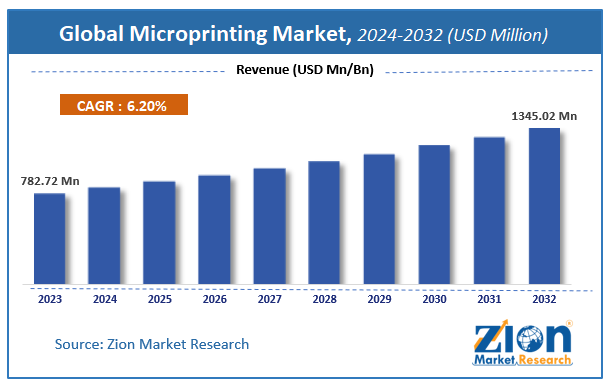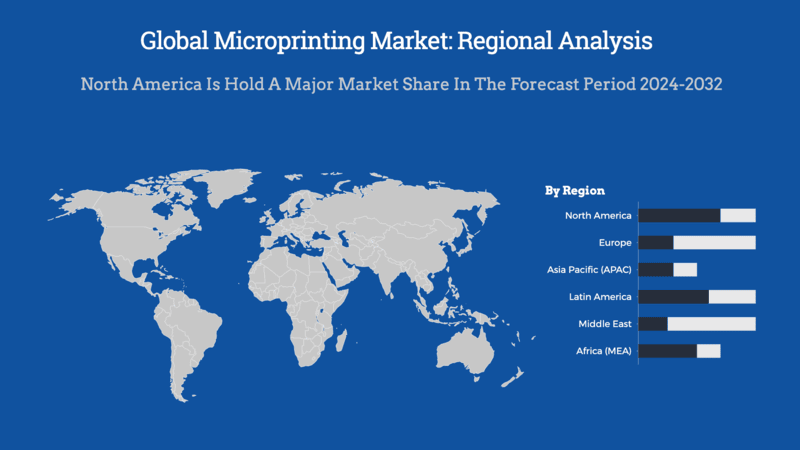Microprinting Market Size, Share, Analysis, Trends, Growth, 2032

Microprinting Market, by Type (Plastic, Metal, and Paper), by Print Type (Single-sided Printing, and Double-sided Printing), by Product Type (Colored, and Monochrome Products), by End-Use (Healthcare, Banking & Finance, Packaging, Government, and Corporate): Global Industry Perspective, Comprehensive Analysis and Forecast, 2024 - 2032
| Market Size in 2023 | Market Forecast in 2032 | CAGR (in %) | Base Year |
|---|---|---|---|
| USD 782.72 Million | USD 1345.02 Million | 6.2% | 2023 |
Global Microprinting Market Insights
According to a report from Zion Market Research, the global Microprinting Market was valued at USD 782.72 Million in 2023 and is projected to hit USD 1345.02 Million by 2032, with a compound annual growth rate (CAGR) of 6.2% during the forecast period 2024-2032. This report explores market strengths, weakness, opportunities, and threats. It also provides valuable insights into the market's growth drivers, challenges, and the future prospects that may emerge in the Microprinting industry over the next decade.
Global Microprinting Market: Overview
Microprinting is the output of familiar characters in a published medium at a measure requiring enlargement of the letters for reading it through the human eye. It is used as an anti-counterfeiting method or an anti-fraud technique to detect the printed small letters not recognized by the human eye. The technique was first introduced by Albert Boni in 1934.
Global Microprinting Market: Growth Factors
Massive application of microprinting in banking & finance, education, packaging, corporate, government, and healthcare sectors as the anti-counterfeit tool will propel the growth of microprinting market. Microprinting is used as a key security tool by corporate and government houses. For instance, identity cards and licenses are imprinted with a unique mark. Apart from this, many of the postal stamps, event ID cards, and cheque slips need single-sided microprinting. Additionally, the players in the packaging sector adopt one-sided microprinting for protecting the packaged products from getting duplicated. This, in turn, has boosted the popularity of microprinting across the globe. Today, there is rampant use of microprinting technology to ensure the security of the items along with its traceability. Furthermore, the introduction of new techniques in microprinting along with the rising in the research activities in universities across the globe for enhancing the quality of microprinting will boost the business trends.
Key Insights
- As per the analysis shared by our research analyst, the global Microprinting Market is estimated to grow annually at a CAGR of around 6.2% over the forecast period (2024-2032).
- In terms of revenue, the global Microprinting Market size was valued at around USD 782.72 Million in 2023 and is projected to reach USD 1345.02 Million by 2032.
- Based on the type, the microprinting holds the largest market share, driven by its cost-effectiveness, faster printing speeds, and superior text quality. It's widely adopted across sectors such as government, retail, education, commercial, and publishing.
- Based on the print type, the Single-sided microprinting dominates this category, primarily utilized in official documents, postage stamps, and ID cards within the government sector. The packaging industry also employs this technology in label wrapping to prevent product duplication.
- Based on the product type, Paper is the leading substrate in microprinting, extensively used in banknotes, checks, and postage stamps to deter counterfeiting.
- Based on the end-use, the Banking and Finance (BFSI), this BFSI sector is the most significant end-user of microprinting, utilizing the technology for currencies, bank checks, employee IDs, and various banking documents to enhance security and prevent fraud.
- Based on the region, North America leads the global microprinting market, attributed to its advanced technological infrastructure, significant investments in research and development, and high demand for security features across industries.
Global Microprinting Market: Dynamics
Key Growth Drivers
The microprinting market is primarily driven by the increasing need for enhanced security features in financial documents, identity cards, and packaging. With the rising instances of counterfeiting and document fraud, governments and organizations are adopting microprinting as a reliable anti-counterfeit measure. The growth of the banking, financial services, and insurance (BFSI) sector, which requires secure printing solutions for checks, currency, and certificates, also fuels market demand. Additionally, advancements in printing technology, including the development of high-resolution inkjet and laser printing, have improved the precision and affordability of microprinting, contributing to its widespread adoption across various industries.
Restraints
Despite its advantages, the microprinting market faces certain restraints, including the high initial investment required for specialized microprinting equipment. Smaller companies and startups may struggle to adopt these technologies due to budget constraints. Additionally, the complexity of microprinting processes and the need for skilled personnel to operate the machinery may limit market growth. The presence of alternative security solutions, such as holograms, watermarks, and digital verification methods, also poses a challenge to the adoption of microprinting. Furthermore, strict regulations regarding the use of microprinting in currency and government documents can restrict market expansion.
Opportunities
The increasing adoption of microprinting in emerging applications, such as pharmaceutical packaging and brand protection, presents significant growth opportunities. Companies are leveraging microprinting to prevent counterfeit drugs and ensure product authenticity. The rise of e-commerce and global trade further drives demand for secure packaging solutions with integrated microprinting features. Additionally, technological advancements, including nanotechnology-based printing and UV-visible microprinting, are creating new possibilities for security printing. Governments in developing regions are also investing in advanced identification systems, including microprinted passports, driving additional market growth.
Challenges
One of the key challenges faced by the microprinting market is the ongoing threat of technological advancements in counterfeiting techniques. As counterfeiters develop sophisticated methods to replicate microprinted security features, companies must continually innovate to stay ahead. Additionally, the integration of microprinting into existing production lines can be technically challenging and costly. Environmental concerns regarding the use of certain inks and printing materials may also pose challenges, as industries shift toward sustainable practices. Furthermore, the lack of awareness about the benefits of microprinting in some regions may hinder market penetration and growth.
Microprinting Market: Report Scope
| Report Attributes | Report Details |
|---|---|
| Report Name | Microprinting Market |
| Market Size in 2023 | USD 782.72 Million |
| Market Forecast in 2032 | USD 1345.02 Million |
| Growth Rate | CAGR of 6.2% |
| Number of Pages | 110 |
| Key Companies Covered | Gallas Label & Decal, Domino Printing Sciences PLC, Team NiSCA, Hewlett-Packard Company, Xerox Corporation, Huber Group, Videojet Technologies, Inc., Diagramm Halbach GmbH & Co. KG, William Frick & Company, Matica Technologies AG, Brady Corporation, Printegra, Ricoh Company Ltd., Micro Format Inc., Canon Finetech Nisca Inc., Data Carte Concepts, and Saueressig GmbH Co KG |
| Segments Covered | By Type, By Print Type, By Product Type, By End-Use And By Region |
| Regions Covered | North America, Europe, Asia Pacific (APAC), Latin America, Middle East, and Africa (MEA) |
| Base Year | 2023 |
| Historical Year | 2018 to 2022 |
| Forecast Year | 2024 - 2032 |
| Customization Scope | Avail customized purchase options to meet your exact research needs. Request For Customization |
Global Microprinting Market: Segmentation
The microprinting market can be sectored into type, print type, product type, and end-use. All the segments have been analyzed based on present and future trends and the market is estimated from 2024 to 2032.
On the basis of type, the industry is segmented into plastic, metal, and paper.
In terms of print type, the microprinting industry is divided into single-sided and double-sided printing.
Based on the product type, the market is segregated into colored and monochrome products.
On the basis of end-use, the industry is classified into healthcare, banking & finance, packaging, government, and corporate.
The regional segment includes the current and forecast demand for North America, Europe, Asia Pacific, Latin America, and the Middle East and Africa.
Global Microprinting Market: Regional Analysis
Region wise, the microprinting market can be divided into five main regions: Europe, Latin America, North America, Asia Pacific, and the Middle East and Africa. Asia Pacific market is slated to witness a massive surge over the years to come. The growth can be attributed to large-scale usage of microprinting technology-driven printers in banks, government agencies, and corporate houses. Apart from this, banking & financial institutions in countries such as India, China, and Japan have set up microprinting systems.
Apart from this, a rise in the number of frauds along with introducing of fake currency notes in these countries has prompted the growth rate of the business in the region. Additionally, the massive need for secured & anti-counterfeit solutions in educational institutes in the region will push the regional market growth.
North America
North America leads the microprinting market, driven by stringent regulatory requirements and a high demand for secure printing solutions across sectors such as banking, government, and corporate entities. The presence of technologically advanced countries like the United States and Canada, coupled with a high adoption rate of modern printing technologies, contributes to the region's dominance. Strong legislation and security measures to combat counterfeiting further bolster the demand for microprinting solutions.
Europe
Europe holds a significant share of the microprinting market, characterized by a strong emphasis on security measures across industries. Countries such as Germany, France, and the United Kingdom are notable contributors, leveraging microprinting to secure official documents, currency, and pharmaceutical packaging. The region's proactive approach towards combating counterfeiting and enhancing product authentication supports the adoption of advanced printing technologies, including microprinting.
Asia-Pacific
The Asia-Pacific region is experiencing rapid growth in the microprinting market, fueled by expanding economies, technological advancements, and increasing awareness of counterfeit threats. Countries such as China, India, and Japan are at the forefront, deploying microprinting extensively in sectors ranging from finance and government to consumer goods and healthcare. The burgeoning e-commerce industry in Asia-Pacific further fuels demand for secure packaging solutions, boosting the adoption of microprinting technologies.
Latin America and the Middle East & Africa
These regions also contribute to the global microprinting market, albeit to a lesser extent compared to others. In Latin America, countries like Brazil and Mexico witness demand primarily from the banking sector and government applications. In the Middle East & Africa, initiatives to enhance document security and combat counterfeiting drive the adoption of microprinting in official documents and currency.
North America and European regions are projected to make major contributions towards the overall market revenue. Increase in the infrastructural spending & research activities in the business verticals such as healthcare and consumer electronics activities in the countries such as the U.S., Canada, UK, and Germany will proliferate the regional market demand.
Global Microprinting Market: Competitive Players
Some of the main participants in microprinting market are:
- Gallas Label & Decal
- Domino Printing Sciences PLC
- Team NiSCA
- Hewlett-Packard Company
- Xerox Corporation, Huber Group
- Videojet Technologies. Inc.
- Diagramm Halbach GmbH & Co. KG
- William Frick & Company
- Matica Technologies AG
- Brady Corporation
- Printegra
- Ricoh Company Ltd.
- Micro Format Inc.
- Canon Finetech Nisca Inc.
- Data Carte Concepts
- Saueressig GmbH Co KG.
This report segments the Global Microprinting Market as follows:
Global Microprinting Market: The Type Analysis
- Plastic
- Metal
- Paper
Global Microprinting Market: The Print Type Analysis
- Single-sided
- Double-sided Printing
Global Microprinting Market: The Product Type Analysis
- Colored
- Monochrome Products
Global Microprinting Market: The End-Use Analysis
- Healthcare
- Banking & Finance
- Packaging
- Government
- Corporate
Global Microprinting Market: Regional Segment Analysis
- North America
- The U.S.
- Canada
- Europe
- France
- The UK
- Spain
- Germany
- Italy
- Rest of Europe
- Asia Pacific
- China
- Japan
- India
- South Korea
- Southeast Asia
- Rest of Asia Pacific
- Latin America
- Brazil
- Mexico
- Rest of Latin America
- Middle East & Africa
- GCC
- South Africa
- Rest of Middle East & Africa
Table Of Content
Methodology
FrequentlyAsked Questions
Microprinting is the output of familiar characters in a published medium at a measure requiring enlargement of the letters for reading it through the human eye.
Massive application of microprinting in banking & finance, education, packaging, corporate, government, and healthcare sectors as the anti-counterfeit tool will propel the growth of microprinting market.
According to a study, the global microprinting Industry size was $782.72 Million in 2023 and is projected to reach $1345.02 Million by the end of 2032.
The global microprinting market is expected to grow at a CAGR of 6.2% during the forecast period.
Asia Pacific market is slated to witness a massive surge over the years to come.
Some of the main participants in microprinting market are Gallas Label & Decal, Domino Printing Sciences PLC, Team NiSCA, Hewlett-Packard Company, Xerox Corporation, Huber Group, Videojet Technologies, Inc., Diagramm Halbach GmbH & Co. KG, William Frick & Company, Matica Technologies AG, Brady Corporation, Printegra, Ricoh Company Ltd., Micro Format Inc., Canon Finetech Nisca Inc., Data Carte Concepts, and Saueressig GmbH Co KG.
The global microprinting market report covers the geographical market along with a comprehensive competitive landscape analysis. It also includes cash flow analysis, profit ratio analysis, market basket analysis, market attractiveness analysis, sentiment analysis, PESTEL analysis, trend analysis, SWOT analysis, trade area analysis, demand & supply analysis, Porter’s five force analysis, and value chain analysis.
Choose License Type
List of Contents
Global Microprinting Market InsightsGlobal Microprinting OverviewGlobal Microprinting Growth FactorsKey InsightsGlobal Microprinting DynamicsMicroprinting Report ScopeGlobal Microprinting SegmentationGlobal Microprinting Regional AnalysisGlobal Microprinting Competitive PlayersThis report segments the Global Microprinting Market as follows:RelatedNews
HappyClients
Zion Market Research
Tel: +1 (302) 444-0166
USA/Canada Toll Free No.+1 (855) 465-4651
3rd Floor,
Mrunal Paradise, Opp Maharaja Hotel,
Pimple Gurav, Pune 411061,
Maharashtra, India
Phone No +91 7768 006 007, +91 7768 006 008
US OFFICE NO +1 (302) 444-0166
US/CAN TOLL FREE +1 (855) 465-4651
Email: sales@zionmarketresearch.com
We have secured system to process your transaction.
Our support available to help you 24 hours a day, five days a week.
Monday - Friday: 9AM - 6PM
Saturday - Sunday: Closed








